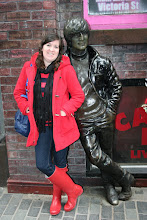It wasn’t the first time I heard the News of the World phone hacking scandal compared to Watergate. But when Carl Bernstein draws the parallel the words ring very true.
I had the good luck to be among an audience on a panel, titled ‘After Hacking: How can the press restore trust?’, organized by The Guardian newspaper. It consisted of Carl Bernstein (Pulitzer-prize winner journalist who broke Watergate along with his colleague Bob Woodward), Sylvie Kaufmann (former editor of Le Monde in Paris), Alan Rusbridger (current editor-in-chief of The Guardian), George Eustice (MP and former press secretary for Prime Minister David Cameron), and chaired by Krishnan Guru-Murthy (anchor/presenter on Channel 4 News).
It was a night of serious journalism porn.
After a general review of how the phone hacking scandal leaked out into the world and culminated in the printing of the very final issue of News of the World this summer, Bernstein was the first to share his opinion on the matter. In making the Watergate comparison, he said the two events were “shattering cultural moments of huge consequence that are going to be with us for generations”, and that they were both “about corruption at the highest levels, about the corruption of the process of a free society”.
In the case of the phone hacking scandal, Berstein said the actions helped “drive the ever descending lowest common denominator of journalism that resulted in a diminution of reporting standards” across the British press. Like the British press really needed one more reason for people to hate it.
I was home in July, right after the scandal really broke across the world. When I met new people or was catching up with old friends, I was constantly reminded about that stereotypical negative that comes with being a journalist, especially in the UK. Even my Dad said that, as a journalist working in London, on that particular July day, I was automatically one of the most hated people anywhere. What’s really interesting to me is that Britian has the most trusted broadcasting media in the world (the BBC) and yet probably the least trusted print media.
Anyways, while the parallels to Watergate were interesting to hear about, it was not the central topic of the panel discussion. Turning to the restoration of trust between the British public and its press, Eustice, the Conservative MP, argued that the press needed tighter regulation. He said “journalists shouldn’t fear regulation” and that there was “not much wrong” with the existing Press Complaints Commission (PCC) code, apart from the fact that it is not really enforced. Bernstein responded that he was horrified at the idea of introducing more severe regulations on the press. He said: “We are headed towards a truth commission if we are going to go down this road.”
Channel 4’s Guru-Murthy polled the audience to find out who was in favour and against stricter legislation for journalists, and the majority of those in attendance, including myself, raised their hands for the latter. Predictably, he next asked any journalists in the audience to raise their hands and, amid an outbreak of laughter, nearly all of us did so. About two-thirds of us were also in our late-20s/early-30s (and Tweeting as the panel discussed), which made me feel a warm glow about my profession and this next generation of brilliant journalists, and the fascinating ways that the industry is growing.
I don’t think I’ve written about this before, but I am coordinating all the social media at my magazine. It is no secret that print, as a medium, is in drastic trouble with newspapers going the way of the dinosaurs, many publications moving online, and the blogosphere giving any random person with a computer the opportunity to become a citizen journalist. At Employee Benefits magazine, I coordinate our daily online news, our Facebook page and our Twitter account. And the leaps and bounds that this medium is growing make me feel very proud to be a part of it.
The issue that is growing, though, is that there is no regulation, and no way to regulate, bloggers and Tweeters. Bernstein pointed to these bloggers and Tweeters and other new forms of media as the clear way forward for journalism. He said: “You’re listening to a bunch of old dinosaurs. People aren’t getting their news from us anymore.” I feel kind of thrilled to be a part of the new generation, wherever it takes us.
And the entire evening made me really proud of my profession, after a long onslaught of negative slant on print media in Britain. Berstein said: “We are not saints in this business. Every day we are faced with the question of privacy and the dissemination of that information. How we answer that question shows what kind of journalists we are.”
The Guardian’s Rusbridger closed the discussion by asserting that we need to achieve the right balance in transparency, and that all journalists need to be in charge of their own transparency. He also referred to the idea of an impending extinction for our industry. “Reporters are like bees,” he said. “Once we lose them we are all fucked.”
Sunday, 16 October 2011
Subscribe to:
Post Comments (Atom)


No comments:
Post a Comment